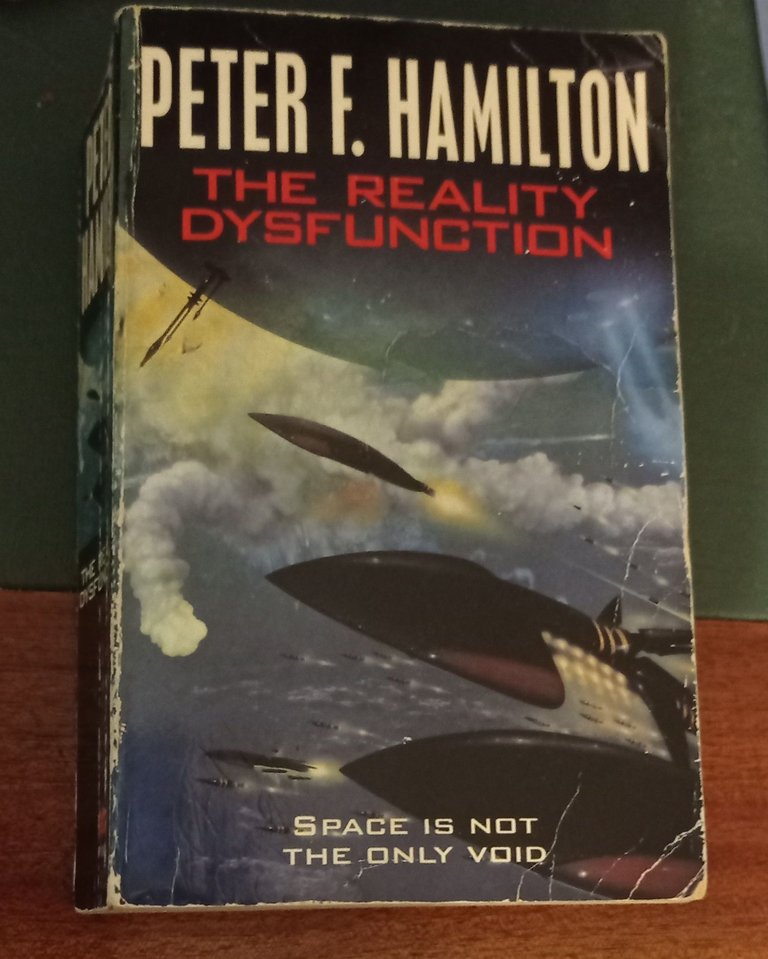Book Review - The Reality Dysfunction by Peter F. Hamilton
When I read fiction, a lot of it is 1960's and 70's pulp sci-fi or space opera. I grew up watching Doctor Who and Blake's Seven. I guess that's reflected in a lot of the creative writing I do, as well !
But there's a second wave of science fiction writers who started publishing from the turn of the century, pioneered by writers like Iain M Banks. They took space opera and updated it in terms of both making the science a bit more credible, and breaking the black and white good/bad dichotomy by creating characters and plots that recognised shades of grey.
This book is a great example of this newer genre of science fiction. It's a bit frightening to think that it's already more than 20 years old !


The Reality Dysfunction is a massive doorstop of a book, coming in at over 1200 pages. It creates a sense of a complete, complex universe by telling at least half a dozen linked stories. They are interwoven and pulled together at the end to reach the conclusion.
I picked my copy of the book up in a local second-hand bookshop, thinking it would be a good holiday read. Well, I started it while I was on holiday, but it took a good few weeks after to finish it, reading a little bit before bed each night.

I'm not going to attempt to summarise the story, because the structure of linked stories means it would probably take a dozen posts ! But the author's worldbuilding skills are impressive. He creates a universe that it internally consistent, has compelling factions with (mostly) realistic motivations and ethics, as well as a complex interplay between those factions.
There are a couple of criticisms I have with the book. First, that it's almost too big, and tries to tell too many stories. I found myself having to go back several chapters sometimes, just to remind myself where a particular story had left off previously.
I think pressure from publishers has a lot to do with this; they want a massive wedge of a book on bookshop shelves to make it look like a blockbuster.
Perhaps it's just the way I prefer to read, but I would rather have been able to buy a series of slimmer books each telling one of the stories but set in the same universe. Then a final book which is where all the characters and stories come together to create the finale. Very much in the way that Michael Moorcock wrote the Eternal Champion cycle.
Some of the stories within the book are stronger than others, which again may well be down to personal preference rather than any inherent failing of the stories themselves. I felt that one or two of the key characters made dumb decisions which might have been great for the story but (even allowing for the fact that in real life we make decisions with incomplete information) just didn't fit with who they were.

So overall, I'd say that this is definitely an enjoyable read.
Many of the characters are well-rounded and well written, and the universe has a number of properly thought out societies that make you think about the ideas they are built around.
But it took a bit too much work in terms of keeping tabs on all the different interwoven stories. The climax at the end, while well written and suitably enthralling, felt like a little bit of a let down in terms of not having the galaxy-spanning scale I'd have expected from a book this long.
I think this one goes into my "worth reading once, now put it on eBay" category. But I'd certainly read other books by Peter F Hamilton.

First published in 1996 by McMillan Books; my copy published in 1997 by Pan Books. 1225 pages. ISBN 0 330 34032 8
The sci-fi genre book in the 90s was very different from most novels in the same year. Wow, it's worth considering reading.
Glad that, despite the criticisms, you found value in the world building and characters. It's always a pleasure to find stories that make you reflect on their societies and motivations.
i'm also if the Dr.Who, Blakes Seven (and The Tomorrow People) era :-)
So much good stuff back then ! I'd almost forgotten the Tomorrow People. Anything by Gerry Anderson was good, and Terry Nation's "Survivors" was incredible. TV and film nowadays is all about CGI, expensive props and big-name actor's salaries; back then, wobbly sets and basic props didn't matter because the writing and acting were so incredibly good.